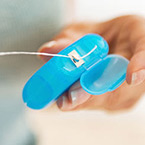The Benefits of Flossing Your Teeth

Summary
Table of Contents

This blog has been reviewed and approved by Dr Robert Lee, a dental professional of 35 years
LEARN MORE >What Are the Benefits of Flossing Your Teeth?
Regular use of dental floss removes plaque, food particles and debris from between teeth. If not removed regularly, plaque can build up and lead to the formation of tartar. Simply flossing your teeth can make them look brighter by removing plaque and excess food particles that you may not see in the mirror or in areas that your toothbrush doesn’t reach. Think of a carpet before and after you vacuum. You may not see the dust and dirt, but once you vacuum and the dust and dirt are removed, the carpet looks brighter. The same principle applies to flossing. Once daily flossing can help remove harmful plaque bacteria, and in turn, help prevent gingivitis, an early form of gum disease from taking root.
The importance of flossing cannot be stressed enough. Daily flossing doesn’t just keep your teeth healthy—practicing good oral hygiene contributes to your health in other ways, too.
It also helps prevent tooth decay and can reduce your risk of developing gum disease by removing plaque. Pairing your flossing routine with twice daily tooth brushing with an electric toothbrush can further promote healthy gums and teeth. Recent studies have shown that regular brushing with an electric toothbrush can prevent tooth loss. The Oral-B iO features the latest in brushing technology to effectively, yet gently, clean all areas of the mouth including tooth surfaces. This removes more of the plaque bacteria that can lead to gum disease and tooth decay.
In addition, flossing allows you to regularly examine your mouth for any swelling or redness. Flossing gives you an opportunity to take a good look at your teeth, tongue, and gums. Certain conditions including some cancers, HIV/AIDS, substance abuse, and eating disorders can cause lesions in your mouth and redness and swelling of the gums.
How Does Flossing Help Your Gums?
Once daily flossing helps remove the harmful plaque bacteria that can lead to gingivitis, an early form of gum disease. When left untreated, gingivitis can progress into a more advanced form of gum disease known as periodontitis. In fact, periodontal disease is the primary cause for tooth loss in adults and chronically unhealthy gums can increase your risk of losing your teeth or a need for a root canal. Even though brushing your teeth twice daily is essential for good oral hygiene, brushing alone may not protect you from gum disease that can result in tooth loss.
Many people who suffer from sensitive or bleeding gums may be tempted to avoid flossing for fear of making their bleeding gums worse. But in fact, flossing can improve the health of your gums, thereby helping to prevent them from bleeding.
In a study from 2006, researchers compared the effects of brushing alone vs. brushing and flossing on bleeding gums in 51 sets of twins. One of each twin pair brushed their teeth twice a day and the other brushed and flossed twice a day. After two weeks, the twins who flossed had 38 percent fewer bleeding gum areas. Even if you were inconsistent about flossing during your childhood or teen years, it’s never too late to start or maintain good oral hygiene, and you can improve the health of your gums with the right floss product.
As a matter of fact, flossing daily (combined with brushing and a rinse) increases protection against gingivitis by removing plaque and food particles, keeping your teeth and gums healthy, while giving you a beautiful smile. Flossing is essential to your smile's health, regardless of your age. And yes, even kids should floss to get used to a healthy oral care routine. You might be asking, "Why is flossing so important?", "What is the importance of flossing?". Here's the answer: By flossing, you remove plaque and food particles in between your teeth and gums and help prevent gingivitis.
On average, one in eight adults in the United States has some form of gum disease. And it's not just older people. Gum disease can start at a very early age, especially if you don't have a proper oral care routine that includes flossing every day.
Flossing and Gingivitis
Gingivitis is the first stage of gum disease. It is also the most treatable. Flossing is a step to keeping your gums healthy.
Smart Prevention Starts with Floss
It's actually pretty simple, flossing is a step that can help prevent the signs and symptoms of gingivitis by removing plaque. When combined with twice daily tooth brushing, you can keep your teeth and gums healthy.
Benefits of Flossing After Eating
It's not always convenient to brush your teeth in the middle of the day. Yet, even flossing after a meal can help promote good dental hygiene and make your mouth feel cleaner, regardless of whether you’re trying to lose weight or just avoid mid-afternoon munchies. Learn more on if you should floss or brush first.
When you do reach for a healthy snack, keep in mind that some popular choices, like pretzels or raisins, and other dried fruits, are good for your health but tend to stick between your teeth. Dried fruits are also high in sugar, which can cause tooth decay along with bacteria. Fortunately, flossing can help keep your teeth clean, so you don’t undermine your healthy efforts with a cavity at your next checkup.
No matter what type of diet you stick to, you can keep your mouth and teeth looking and feeling great by following a regular oral care routine of brushing your teeth twice daily and daily flossing.
Dental Conditions Preventing You from Flossing
Daily flossing is an important component of plaque removal, but it’s one that many people avoid because they find flossing painful. But the right flossing products can make flossing easy and more comfortable, like Oral-B Glide Pro-Health Comfort Plus Mint Floss. Its Comfort Plus technology is extra soft and gentle on gums.
Many people think that standard dental floss is the only effective product for tooth flossing. But there are many products to meet the needs of people of all ages with any type of dental condition. If one of these conditions applies to you, consider some specialized flossing options:
- You have sensitive gums. If you have sensitive teeth and gums that bleed easily, choose a soft floss that slides easily and comfortably between the teeth, like Oral-B Glide Pro-Health Comfort Plus Mint Floss.
- You have braces. If you wear braces or have dentures, that doesn’t mean you can’t floss. Try a specialized floss like Oral-B Super Floss which has a stiff end that you can thread beneath the main wire of your braces and a spongy component that slides easily between the teeth.
Learn how to brush teeth and floss with braces. - You have a child. It’s important to teach children the benefits and importance of flossing at a young age. You can start teaching children to floss their teeth at about age 5-7 years and continue to supervise them as they floss until the age of 10. Many children are less than enthusiastic, and they may complain that flossing hurts or is difficult. Consider introducing floss picks into their routine to make it easier and more convenient.
- You have difficulty manipulating floss. Try using a water flosser in conjunction with regular string floss like Oral-B Glide Floss. A water flosser is neat and easy, especially if you don’t like reaching into the back of your mouth. And a water flosser provides the right amount of pressure to leave your gums feeling pleasantly stimulated. The Oral-B Water Flosser Advanced features the latest in gum care Oxyjet Technology with water-enriched, microbubbles of air—to help target and help eliminate plaque bacteria for cleaner teeth and healthier gums.
From Oral-B, the #1 dentist-recommended floss brand.
†Based on surveys conducted between November 2018 and June 2020 and confirmed to be statistically significant at a 95% confidence level by Radius Illumination, September 25, 2020.
Sources
- http://www.oralhealthplatform.eu/our-work/the-state-of-oral-health-in-europe/
- Yaacob M, ey al… Powered versus manual toothbrushing for oral health.Cochrane Database of Systematic Reviews 2014, Issue 6. Art. No.:CD00282. DOI:10.1002/14651858.CD002281.PUB3
- Kantar.https://onlinelibrary.wiley.com/doi/epdf/10.1111/jcpe.13126
Table of Contents
- What Are the Benefits of Flossing Your Teeth?
- How Does Flossing Help Your Gums?
- Benefits of Flossing After Eating
- Dental Conditions Preventing You from Flossing
-
- Sources

This blog has been reviewed and approved by Dr Robert Lee, a dental professional of 35 years
LEARN MORE >
Sign Up
for expert advice and exclusive offers

Sign Up
for expert advice and exclusive offers







